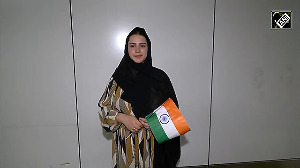India's proposal to resume talks with Pakistan has been welcomed by the Pakistani media, with leading dailies saying the move amounted to a realistic understanding of regional ground realities and would come as a "slap" to terrorists opposed to peace between the two nations.
India recently proposed talks at the level of the foreign secretaries, following which Pakistan sought a clarification on the agenda of the parleys.
India put the composite dialogue on hold in the wake of the 2008 Mumbai terror attacks.
The Daily Times newspaper, in its editorial 'Time to move forward', said that by not resuming the composite dialogue, India had played into the hands of elements responsible for the Mumbai attacks.
Calling on both countries to realise "that the nexus of terrorists is no respecter of borders", the daily said, "The revival of dialogue will be a slap in their faces."
Terrorists are the "common enemy" of India and Pakistan, which have to stand together to fight them.
"Opting for a freeze in the dialogue is exactly what the terrorists aimed for," the editorial said.
It added that "the most important thing is that sense has finally prevailed and both sides have realised that it is time to move forward".
The Nation daily, which is extremely critical of New Delhi's policies, said in its editorial 'Back to dialogue' that the call for talks are reflective of India's gradual move towards a more realistic understanding of regional ground realities.
"Foremost among these realities is the fact that there is no way out of the bilateral dialogue with nuclear Pakistan. The alternative of warmongering threats and brinkmanship strategic doctrines simply will not work as India has found out when none of these tactics worked against Pakistan," it said.
The Daily Times also noted that Indian Home Minister P Chidambaram had said in a recent interview that someone living in India or an Indian himself could have provided help during the Mumbai attacks.
"Putting all the blame on Pakistan while turning a blind eye to the insider factor was wrong, but India's finally admitting the possibility of this aspect bodes well for both countries," it said.
The News too hailed India's move to hold talks, calling it a "welcome" development.
"After remaining reluctant to have anything but the most limited contact with Islamabad for over a year, New Delhi has changed its tone. The offer of foreign-secretary level talks marks an important step forward," an editorial in the newspaper said.
"The development though is a hugely welcome one. It marks a key step forward for the two neighbours who have been caught up in the hostilities that followed the 2008 Mumbai attacks. Perhaps New Delhi has realised that the only way to prevent further attacks of a similar nature is through cooperation with Pakistan," the News said.
It also said terrorism "should indeed be a part of any dialogue. However, the talks must go beyond this; and in indicating that it is ready to resume the disrupted process of prisoner exchange, India seems willing to move in this direction."
However, The Nation cautioned that "unless India is actually intent on a serious and meaningful dialogue on all conflictual issues, merely resuming the dialogue to fool powerful allies, will achieve little in terms of peace and stability".
"The other ground reality is that Kashmir holds the key to regional peace and it is high time India honoured its commitment to the UN and the Security Council resolutions calling for a plebiscite in Kashmir," it added.








